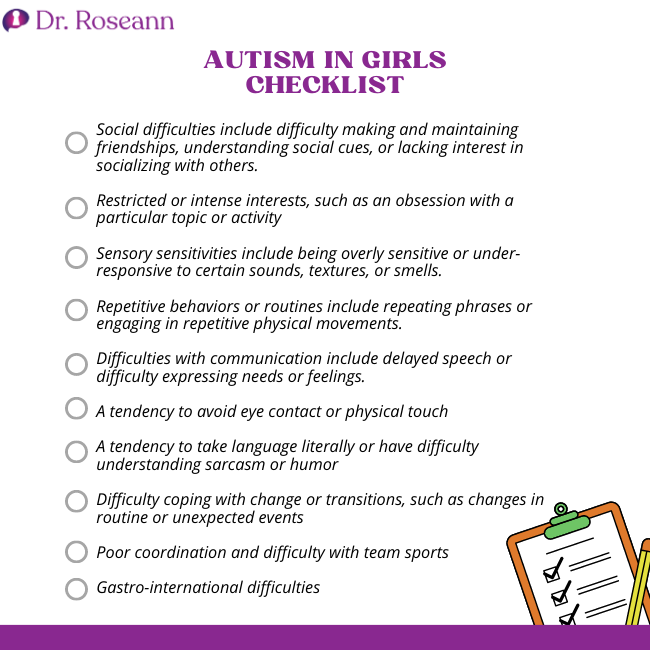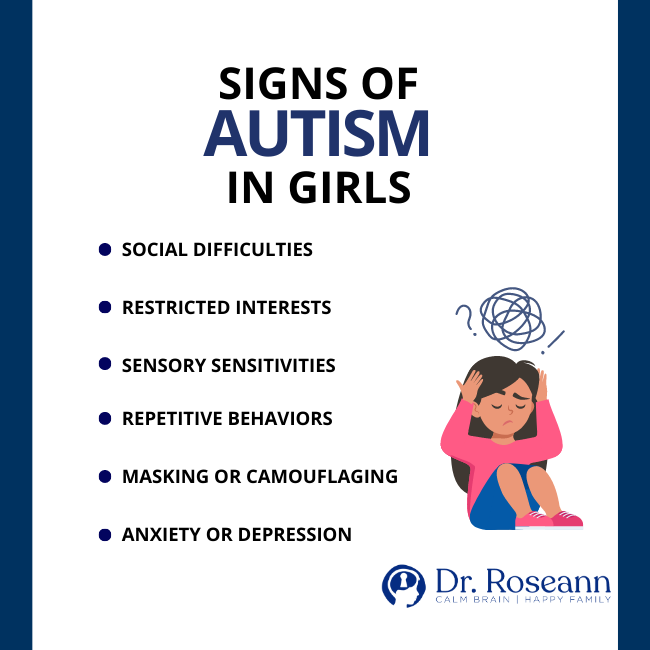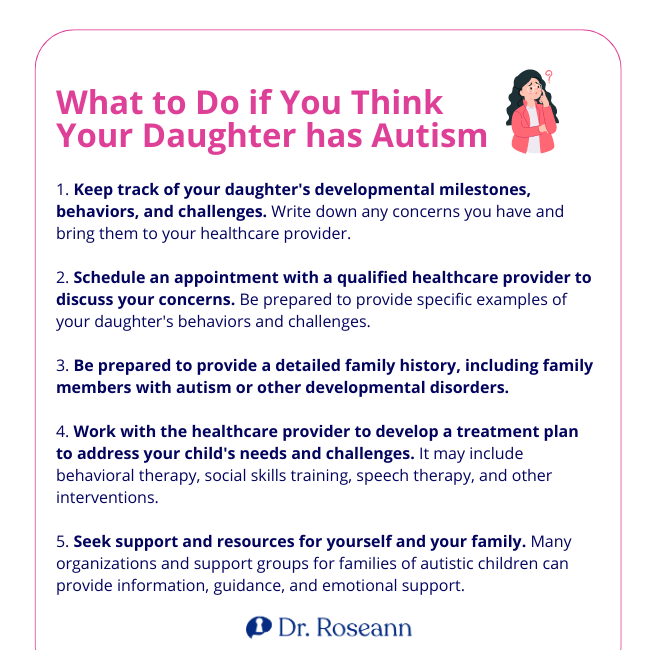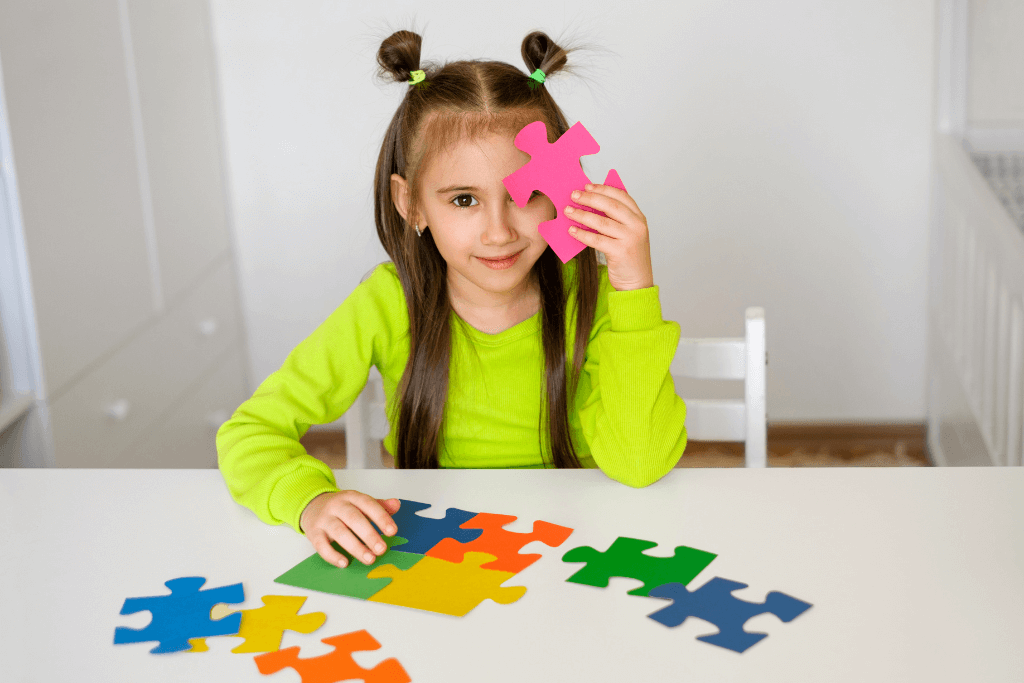Autism Spectrum Disorder affects approximately 1 in 54 children in the United States. While autism is often considered a predominantly male disorder, recent research suggests that autism in girls is more common than previously thought (Lai et al., 2015).
However, autism in girls can often go undiagnosed or misdiagnosed due to its unique presentation and the pattern of assets an individual can have that can mask some of the core features. Understanding the specific needs and experiences of girls with autism makes it possible to work towards improving their outcomes and increasing awareness and understanding of this complex condition.
Autism in Girls Checklist

It's important to note that there is no definitive checklist for autism, as autistic traits can manifest differently in every individual. However, here are some common signs and symptoms of autism in girls:
☐ Social difficulties include difficulty making and maintaining friendships, understanding social cues, or lacking interest in socializing with others.
☐ Restricted or intense interests, such as an obsession with a particular topic or activity
☐ Sensory sensitivities include being overly sensitive or under-responsive to certain sounds, textures, or smells.
☐ Repetitive behaviors or routines include repeating phrases or engaging in repetitive physical movements.
☐ Difficulties with communication include delayed speech or difficulty expressing needs or feelings.
☐ A tendency to avoid eye contact or physical touch
☐ A tendency to take language literally or have difficulty understanding sarcasm or humor
☐ Difficulty coping with change or transitions, such as changes in routine or unexpected events
☐ Poor coordination and difficulty with team sports
☐ Gastro-international difficulties
Signs of Autism in Girls

Autistic girls can look different from how it manifests in boys, and it can sometimes be harder to diagnose. In conjunction with the checklist listed above, here is a more detailed take on the differences between autism in boys and girls.
1. Social difficulties
Girls with autism may struggle with social interactions, such as making eye contact, understanding social cues, and initiating or maintaining conversations
2. Restricted interests
Autistic girls may be interested in specific topics or activities, such as animals, fantasy worlds, or music.
3. Sensory sensitivities
These girls may be overly sensitive or under-responsive to sensory stimuli like sounds, smells, textures, or light.
4. Repetitive behaviors
Girls with autism may engage in repetitive behaviors, such as lining up toys, flapping their hands, or spinning around.
5. Masking or camouflaging
Autistic girls may learn to mask or camouflage their symptoms, often by imitating their peers or suppressing their natural behaviors, leading to misdiagnosis or delayed autism diagnosis. They may be perceived as “smart but shy” and hide their social difficulties in a more socially acceptable way.
6. Anxiety or depression
These girls may be more prone to anxiety or depression than their neurotypical peers due to social and emotional challenges. They can also experience clinical mental health issues due to bullying or social isolation.
Why is Autism in Females Underdiagnosed?
We know that girls with autism are frequently diagnosed later than boys or may not even be diagnosed until adulthood. I have a friend that wasn’t diagnosed with autism until age 40, and when she received her diagnosis, she felt so validated because she knew her “incredible brain was different, not broken.” It helped her harness her gifts and stop feeling like something was “wrong” with her. She created a multi-million dollar company after getting the correct diagnosis.
Autism in females is often underdiagnosed or misdiagnosed for various reasons, including
1. Differences in Symptom Presentation
Autistic females may present with symptoms that are different from those typically seen in males, such as better social skills, more subtle repetitive behaviors, and a greater focus on social relationships.
These atypical symptoms can make it more challenging to recognize autism in females, especially for professionals who may be more familiar with the male presentation of the disorder.
2. Camouflaging or Masking
Females with autism may learn to mask or camouflage their symptoms to fit in with their peers, making it harder for professionals to recognize their difficulties. It can lead to misdiagnosis or delayed diagnosis and increased mental health problems due to the stress of hiding their symptoms.
3. Diagnostic Criteria Based on Male Presentation
Historically, the diagnostic criteria for autism were based on observations of males with the disorder, which may not accurately reflect the experiences of females. Therefore, it can result in a diagnostic bias toward identifying autistic males over females.
4. Gender Stereotypes
There is a cultural bias toward viewing autism as a predominantly male disorder, which can lead to healthcare professionals overlooking or dismissing symptoms in females. Additionally, females are often expected to exhibit better social skills than their male counterparts, which can further contribute to the underdiagnosis of autism in females.
Why Can Girls Hide Their Autism But Boys Can't?
It's important to note that not all girls with autism can hide their symptoms, and not all boys with autism are unable to hide their symptoms. However, there are some theories as to why some girls with autism may be able to mask or camouflage their symptoms more effectively than boys.
One theory is that girls may be more socially motivated and adept than boys and, therefore, may be more likely to imitate their peers and learn social skills, even if they struggle with them. As a result, it's easier for girls with autism to blend in and mask their difficulties.
On the other hand, boys may be more likely to engage in overt repetitive behaviors, have more obvious social difficulties, and have gross motor coordination issues making it more difficult to hide their symptoms.
Also, girls weren’t pushed socially to participate in team sports that could highlight the same coordination issues as their male counterparts.
Another theory is that societal and cultural factors may make girls more likely to mask their symptoms. For example, girls are often expected to be more social and empathetic than boys and may face more pressure to fit in and conform to social norms. Therefore, it can lead to girls learning to mask their symptoms to avoid social stigma or rejection.
It's essential to recognize that both boys and girls with autism may struggle with social communication and repetitive behaviors but may present these symptoms differently. Increased awareness and understanding of the unique presentation of autism in girls can help to ensure that they receive appropriate diagnosis and treatment.
Why Do Autistic Girls Usually Get Diagnosed Later?
From a brain perspective, autism in girls is often missed because boys tend to have more coordination issues. Regarding autism, the greater the coordination issues, the greater the difficulties in all areas of daily living.
Girls, on the other hand, don't have the same level of those coordination issues. And as noted before, they aren’t pushed to do team sports that would show their coordination issues.
They are also more likely to get identified as shy and awkward. On the other hand, they will be considered studious and shy if they have very high intellect.
If their issues get identified, they often could be clinically diagnosed with anxiety, OCD, or ADD. However, they may not get the proper diagnosis until much later, particularly as they get to high school or college. Since autism in girls is diagnosed later than in boys, it takes time for the former to get appropriate help.
Autistic people need to learn social skills, which should be explicitly taught. It's not enough to just put these kids into play, especially for those who are cognitively bright. All kids must develop their emotional skills and learn coping skills because they will need them throughout their lives.
Additionally, girls are good at camouflaging or masking their symptoms, which can be a double-edged sword. While it may help them fit in and avoid negative social consequences, it can also increase stress and anxiety as they struggle to maintain their facade. It means they internalize these challenges, which will show up negatively. Gaining good coping skills is essential.
As girls on the autism spectrum also tend to exhibit more subtle symptoms, healthcare professionals may overlook or misinterpret them. It can also lead to delayed diagnosis and treatment, which can have negative long-term consequences.
Furthermore, girls may be more socially motivated and work harder to imitate their peers, making it more challenging to identify their social communication and interaction difficulties. Since girls are often expected to have better social skills than boys, they may be more likely to be diagnosed with other mental health issues, such as anxiety or mood disorders, rather than autism.
The lack of awareness and understanding of the unique presentation of autism in girls among healthcare professionals can also delay the diagnosis. Many healthcare professionals may not be trained to recognize the subtle differences in symptom presentation between autistic boys and girls on the spectrum.
How Does Autism Present Different in Girls Than in Boys?
ASD presents differently in girls than in boys. Historically, autism has been viewed as a predominantly male condition. However, recent autism research has shown that it is underdiagnosed in females due to differences in how girls and boys with autism present (Loomes et al., 2017).
Regarding social communication, girls with autism may have better social communication skills than boys. However, they may still struggle with making and maintaining friendships and have difficulty understanding social cues.
About restricted interests, girls with autism may have more socially acceptable or typical interests than boys. For example, they may be interested in animals, dolls, or other traditionally feminine toys. They may also be more interested in relationships and social dynamics than other topics.
For repetitive behaviors, girls with autism may engage in more subtly repetitive behaviors than boys. For example, they may play with their hair or clothing or bite their nails. They may also have more internalized repetitive behaviors, such as counting or repeating phrases in their heads.
Is Treatment for Autism in Women Different from Men?
While no specific treatments differ based on gender differences, the approach to treatment for autism may vary depending on the individual's needs, strengths, and challenges. For example, treating autism in women typically involves a multidisciplinary approach that addresses the core symptoms of autism, including difficulties with social communication and interaction, repetitive behaviors and special interests, and sensory processing issues.
A critical aspect of treatment for autism in women is addressing co-occurring conditions that may be more common in females, such as anxiety, depression, and eating disorders. Autistic women may also be more vulnerable to trauma and abuse; addressing any mental health concerns arising from these experiences is essential.
Social skills training is a crucial component of treatment for autism in both men and women. However, social skills training for women may focus more on developing assertiveness and self-advocacy skills. Women with autism may be more prone to social anxiety and difficulties asserting themselves in social situations.
Sensory processing issues can also be more pronounced in young women with autism, and early intervention, such as occupational therapy, may help address these difficulties. Additionally, cognitive-behavioral therapy may help manage anxiety and assist individuals with autism in developing coping skills.
Treating autism in women involves a personalized, individualized approach considering each individual's unique needs and challenges. Therefore, it is vital for healthcare professionals to be aware of the unique presentation of autism in women and to tailor treatment accordingly. The use of neurofeedback, CALM PEMFTM, and nutritional supplementation may help.
What to Do if You Think Your Daughter has Autism
Suppose you suspect your daughter may have autism. In that case, it is essential to seek a comprehensive evaluation from a qualified healthcare professional, such as a pediatrician, child psychiatrist, or psychologist specializing in autism. Here are some steps:

1. Keep track of your daughter's developmental milestones, behaviors, and challenges. Write down any concerns you have and bring them to your healthcare provider.
2. Schedule an appointment with a qualified healthcare provider to discuss your concerns. Be prepared to provide specific examples of your daughter's behaviors and challenges.
3. Be prepared to provide a detailed family history, including family members with autism or other developmental disorders.
4. Work with the healthcare provider to develop a treatment plan to address your child's needs and challenges. It may include behavioral therapy, social skills training, speech therapy, and other interventions.
5. Seek support and resources for yourself and your family. Many organizations and support groups for families of autistic children can provide information, guidance, and emotional support.
Remember, early diagnosis and intervention are keys to improving outcomes for children with autism. If you have concerns about your daughter's development or behavior or if she's diagnosed with autism, don't hesitate to seek an evaluation with a qualified healthcare professional and get her the support she needs.
Citations
Lai, M.-C., Baron-Cohen, S., & Buxbaum, J. D. (2015). Understanding Autism in the light of sex/gender. Molecular Autism, 6(1). https://doi.org/10.1186/s13229-015-0021-4
Loomes, R., Hull, L., & Mandy, W. P. L. (2017). What Is the Male-to-Female Ratio in Autism Spectrum Disorder? A Systematic Review and Meta-Analysis. Journal of the American Academy of Child & Adolescent Psychiatry, 56(6), 466–474. https://doi.org/10.1016/j.jaac.2017.03.013
Always remember… “Calm Brain, Happy Family™”
Are you looking for SOLUTIONS for your struggling child or teen?
Dr. Roseann and her team are all about solutions, so you are in the right place!
There are 3 ways to work with Dr. Roseann:
You can get her books for parents and professionals, including: It’s Gonna Be OK™: Proven Ways to Improve Your Child’s Mental Health, Teletherapy Toolkit™ and Brain Under Attack: A Resource For Parents and Caregivers of Children With PANS, PANDAS, and Autoimmune Encephalopathy.
If you are a business or organization that needs proactive guidance to support employee mental health or an organization looking for a brand representative, check out Dr. Roseann’s media page and professional speaking page to see how we can work together.
Dr. Roseann is a Children’s Mental Health Expert and Therapist who has been featured in/on hundreds of media outlets including, CBS, NBC, FOX News, PIX11 NYC, The New York Times, The Washington Post,, Business Insider, USA Today, CNET, Marth Stewart, and PARENTS. FORBES called her, “A thought leader in children’s mental health.”

She is the founder and director of The Global Institute of Children’s Mental Health and Dr. Roseann Capanna-Hodge. Dr. Roseann is a Board Certified Neurofeedback (BCN) Practitioner, a Board Member of the Northeast Region Biofeedback Society (NRBS), Certified Integrative Medicine Mental Health Provider (CMHIMP) and an Amen Clinic Certified Brain Health Coach. She is also a member of The International Lyme Disease and Associated Disease Society (ILADS), The American Psychological Association (APA), Anxiety and Depression Association of America (ADAA) National Association of School Psychologists (NASP), International OCD Foundation (IOCDF) International Society for Neurofeedback and Research (ISNR) and The Association of Applied Psychophysiology and Biofeedback (AAPB).
© Roseann-Capanna-Hodge, LLC 2023
Disclaimer: This article is not intended to give health advice and it is recommended to consult with a physician before beginning any new wellness regime. *The effectiveness of diagnosis and treatment vary by patient and condition. Dr. Roseann Capanna-Hodge, LLC does not guarantee certain results.













